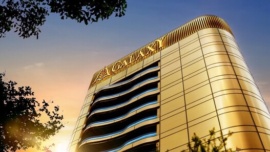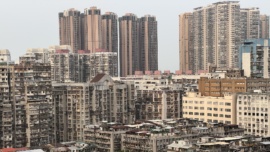While the Macau Government remarked last week that a review is to be soon conducted of Mainland China’s Individual Visit Scheme (IVS), Hong Kong Chief Executive Leung Chun Ying said yesterday that his administration would meet with Beijing in March. High on the agenda will be the tightening of arrangements under the IVS scheme for Mainland tourists visiting the city given its increasingly challenged tourism capacity.
Speaking ahead of an Executive Council meeting yesterday morning, Mr. Leung said he would raise the issue of a possible tightening of the IVS policy with the central government when attending the concurrent sessions of the National People’s Congress and Chinese People’s Political Consultative Conference in Beijing early next month.
The Hong Kong Chief Executive noted that he understood the growing influx of Mainland Chinese visitors into the city has “formed pressure on people’s livelihoods”, and that he did not agree to further increasing the number of eligible areas in the Mainland that could apply for the IVS visa to travel to Hong Kong.
“I’ve always expressed to the central authority that our [tourism] capacity is limited, and that I don’t agree to adding more cities eligible for the Individual Visit Scheme,” Mr. Leung said, speaking to media yesterday. “In fact, for the Mainland residents – whether they’re travelling in groups or on a multi-visit permit, or on the Individual Visit Scheme – the policy has never been changed or relaxed. We understand that the growing number of tourists has formed increasing pressure on people’s livelihoods.”
“Firstly, there has been no relaxed [IVS] policy; and secondly, we’re discussing with Beijing whether there’s room to tighten the policy, so that the natural growth of Mainland tourists coming here can be controlled,” he added.
A similar concern about the huge number of Mainland Chinese tourists coming here and its impact on the quality of life of residents in the MSAR has also prompted the Macau Government to review the IVS policy with Mainland authorities after the Chinese New Year vacation, Macau’s Secretary for Social Affairs and Culture Alexis Tam Chon Weng told reporters last week.
At the time, the Secretary said he did not have draft plans improving the IVS visa policy but he has noted the possible tightening of arrangements under the scheme.
The Director of the Macau Travel Industry Council, Andy Wu Keng Kuong, said he did not expect that a possible tightened IVS policy by the Hong Kong government would overly impact Macau.
“For the joint tour of Hong Kong and Macau, this route is actually much more adopted by package tours than individual Mainland visitors,” Mr. Wu remarked to Business Daily.
“Currently, Hong Kong is running a multiple-visit permit system for Mainland visitors, which Macau is not,” said Mr. Wu. “For Macau, where many of our IVS visitors are from Guangdong, they can only apply for such visa every two months – and this in effect is already a cap in itself [thus] I think any further cap on tourist arrivals is not necessary.”
The Council’s director reckons that the city’s current number of hotel rooms and infrastructure can still support the growing influx of tourists, although the government could introduce a shuttle service to help divert visitors away from much populated sites like San Ma Lou on the Macau Peninsula during festive seasons.
For Hong Kong and Macau, the IVS policy currently allows Mainland Chinese living in 49 eligible cities of the Mainland to apply for a travel permit to visit individually instead of applying under a tour group visa.
Macau received a record 31.5 million visitors last year, of whom 67.4 per cent or over 21 million were from Mainland China, according to the Statistics and Census Service.
About 9.57 million Mainland Chinese visitors travelled here last year under the IVS scheme, representing about 45.6 per cent of total Mainland visitor arrivals. Around 47 per cent of these aggregate Mainland visitor arrivals, or 9.98 million visitors, travelled here on a tour group visa.























